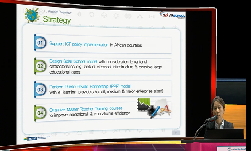Higher education is often credited with being an effective means for an individual to invest in and acquire skills and knowledge---often referred to as human capital. Participating in higher education may also provide an individual with the opportuni...
http://chineseinput.net/에서 pinyin(병음)방식으로 중국어를 변환할 수 있습니다.
변환된 중국어를 복사하여 사용하시면 됩니다.
- 中文 을 입력하시려면 zhongwen을 입력하시고 space를누르시면됩니다.
- 北京 을 입력하시려면 beijing을 입력하시고 space를 누르시면 됩니다.
Higher education in the creation of individual social capital: A student organization ethnography.
한글로보기https://www.riss.kr/link?id=T13410019
- 저자
-
발행사항
[S.l.]: University of Pittsburgh 2013
-
학위수여대학
University of Pittsburgh Administrative and Policy Studies
-
수여연도
2013
-
작성언어
영어
- 주제어
-
학위
Ph.D.
-
페이지수
399 p.
-
지도교수/심사위원
Adviser: James Jacob.
-
0
상세조회 -
0
다운로드
부가정보
다국어 초록 (Multilingual Abstract)
Higher education is often credited with being an effective means for an individual to invest in and acquire skills and knowledge---often referred to as human capital. Participating in higher education may also provide an individual with the opportunity to build valuable relationships with individuals that result in access to resources such as information, the mutual exchange of favors, emotional support and career networking---often referred to as social capital. While it is understood that higher education is an effective way for an individual to invest in and accumulate human capital, it is not as clearly understood how higher education can be an effective way for an individual to invest in and accumulate other forms of capital, such as social capital. The consequence of not having an equivalent emphasis on how higher education creates social capital among students potentially implies that higher education may not be explicitly making an effort to promote opportunities for social capital investment; students and researchers may not be aware that higher education can facilitate social capital investment; and students may not understand the application of social capital in their own lives. In response to the lack of emphasis on higher education as a form of social capital investment, this study looks at one segment of higher education, namely undergraduate student participation in student organizations, to explore the potential opportunities for social capital accumulation in higher education. Qualitative research methodology was used to collect, analyze and interpret comprehensive narrative and visual data to gain insights in the phenomenon of higher education in the creation of social capital. The population for the study was undergraduate students at the University of Pittsburgh who participate in student organizations. As the result of criterion-based sampling, the sample chosen for the study was the Blue and Gold Society, a student ambassador organization that supports and represents the University while providing members with opportunities to network with faculty, staff, other students, university donors, alumni and community members. Ethnography, more specifically participant observation, semi-structured interviews and cultural artifact review, were utilized to collect the data. Computer assisted qualitative data analysis software was utilized to efficiently manage, organize and analyze data. The results from the research study answer the questions: 1) What individuals make up an undergraduate student organization member's social network and how are those relationships developed? 2) What forms of social capital are embedded in the social networks of undergraduate student organization members? 3) What role does trust play in an undergraduate student organization member's access to social capital and how is trust developed among social network members? The findings state that members of the Blue and Gold Society student organization are able to collectively invest in and accumulate 18 forms of social capital amongst a social network of 30 distinct individuals/types of individuals; Society members develop relationships with these individuals through 21 distinct processes; trust plays a role in Society members' ability to invest in and access social capital embedded in their social networks; and, Society members utilize 16 distinct processes to develop trust within their relationships with social network members. Recommendations are provided for higher education student affairs professionals, researchers, institutional leadership and assessment designers.
분석정보
연관 공개강의(KOCW)
-

Education Policy at the Party Conferences
Teachers TV Teachers TV -

2014 이러닝 국제 콘퍼런스 : What is the Lessons from Education Support Project~
한국교육정보진흥협회 Boseon, Kim -

Early Sex Education: The Debate
Teachers TV Teachers TV -

Alcohol Education: Here's What We Want
Teachers TV Teachers TV -

Personal Finance Education: The Money Quiz
Teachers TV Teachers TV






